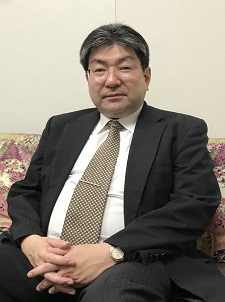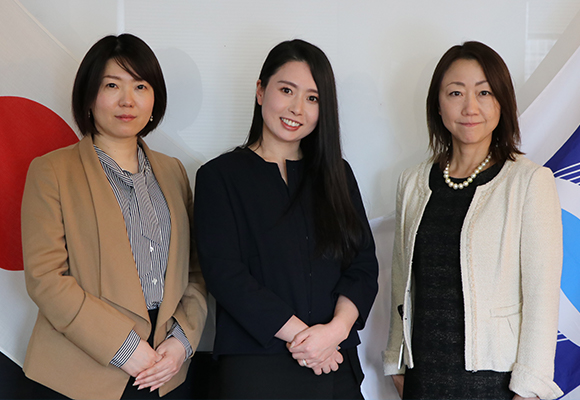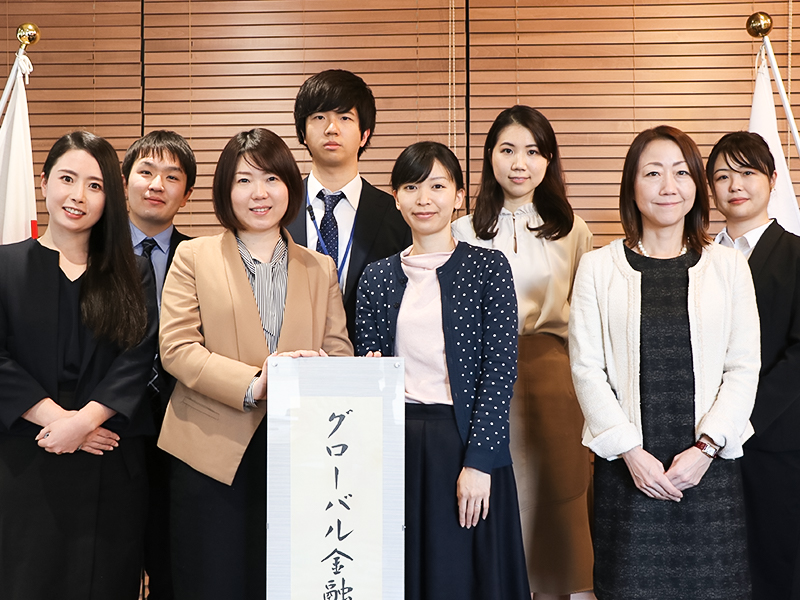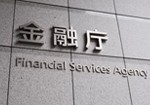FSA Staff Members
The Global Financial Partnership Center (GLOPAC) is part of the International Affairs Office of the Financial Services Agency. As the staff of the center, we strive to ensure that our Fellows get the most possible out of the Program. We look forward to welcoming you into the GLOPAC community.
Message from the President of GLOPAC
 Kawasaki SatoruThe President of GLOPAC
Kawasaki SatoruThe President of GLOPAC
GLOPAC was established in April 2016 as the successor to the Asian Financial Partnership Center (AFPAC), which opened in April 2014. Through its Programs, GLOPAC aims to address issues related to global financial markets, assist with the technical development of financial sector infrastructure, and strengthen cooperative relationships with financial regulatory authorities around the world. During the 2 to 3 month Program, Visiting Fellows will learn about the Japanese banking, securities, and insurance sectors. They also have the opportunity to learn from other Visiting Fellows through their presentations and discussions. We hope to give our Fellows a good opportunity to gain knowledge that will help them as they work to further develop the financial markets in their home countries.
With the cooperation of our stakeholders, our Programs create indispensable value for our Visiting Fellows. Our stakeholders include industry organizations, universities, other Japanese government bodies that provide non-FSA perspectives, foreign financial authorities that recommend highly qualified officials, and the senior and frontline FSA officials who provide majority of the lectures. Even as the world changes, we commit ourselves to growing and developing the Fellowship Program to meet the needs of our participants.
Finally, I would like to thank the founding members of the Program and previous Secretariat for leaving us this wonderful institutional asset. To our Fellows both past and present, I would like to say that completion of your Program is just the start of our relationship. It is my great pleasure to meet again with former Visiting Fellows around the world and see how they have applied the knowledge and experience they gained during the Program.
Message from the GLOPAC Secretariat Staff

Executive Director
Deputy Director
Staff

To ensure that our Visiting Fellows’ time in the GLOPAC Fellowship Program is fruitful and beneficial, we arrange sessions based on their areas of interest. Before the Program begins, we ask what our Visiting Fellows would like to learn during the Program and schedule sessions accordingly. During the Program, we check in with Fellows to better understand their interests and what they want to learn more about. We also can add lectures and events to help our Fellows get the information they need and answers to questions from previous sessions. Furthermore, the Fellowship Program is split into three specialized tracks: banking, securities, and insurance. Fellows have the opportunity to expand their knowledge by attending sessions arranged to address other participants’ interests. We also include sessions led by industry associations, research institutes, and private companies to allow our Fellows to hear not only from regulators and industry supervisors but also from the private sector. We are grateful to all of our contributors who make lectures, share experiences, and form friendships with our Fellows.
Outside of the sessions, we use the lunch time break to introduce aspects of Japanese culture, customs, food, and beautiful scenery, such as cherry blossoms in spring, the sea and mountains in summer, colored leaves in autumn, and Mt. Fuji covered with snow in winter. It is our great pleasure to share all that Japan has to offer with our Fellows.
We work very closely with our GLOPAC Fellows for 2 to 3 months, and by the end of each Program, both Fellows and secretariat staff have become like family—brothers and sisters in finance. We are always surprised by how, on the very first day at FSA, everyone looks so serious and distant, but by the last day it is all hugs and smiles. We never say “good-bye,” but always “see you soon.” We know that we will meet each other again sometime soon, somewhere in the world, and we believe the connections and network made during the Program will help further the development of a global, sustainable financial market.

Speeches and Publications from FSA Staff
January 8, 2021
The Japanese Banking Crisis
Commissioner of the Financial Services Agency, Himino Ryozo, published a book analyzing the Japanese financial crisis of the 1980s through the 2000s, based on lectures he gave to the Visiting Fellows at GLOPAC.
By Himino Ryozo, Commissioner of the Japanese Financial Services Agency
Please click the link below from which you can download his eBook for free.
It is a great honour and pleasure for me to be here today to talk about how we can promote financial inclusion and long-term investment in Asia today. In my view, channelling small savings to productive investment is the key.
It is a great honour and pleasure for me to be here today to talk about how we can promote financial inclusion and long-term investment in Asia today. In my view, channelling small savings to productive investment is the key.
(END)
May 19, 2016
5 Minute Read
Jump-Starting Financial Inclusion and Long-Term Investment in Asia: From Small Savings to Productive Investment
At the Symposium on Financial Industry to Contribute to Revitalizing Regional Economy in Japan and Asia
By Masamichi Kono, Vice Commissioner for International Affairs and President of the Global Financial Partnership Center
1. Introduction
It is a great honour and pleasure for me to be here today to talk about how we can promote financial inclusion and long-term investment in Asia today. In my view, channelling small savings to productive investment is the key.
I should mention at the outset that any views I express here today are my own, and cannot be attributed to the Financial Services Agency, or any other organization I am associated with.*1
It goes without saying that there is a vast potential for development of the financial sector in many Asian countries. Many of the people do not yet have access to bank deposits, and the savings Asians generate are often not sufficient to finance the vast investment needs of the region.
There is actually huge potential demand for infrastructure projects, requiring long-term finance to be generated to finance them. For instance, the World Bank estimates that globally, infrastructure projects require more than $800 billion in investment per year until 2020. In the Asian context, according to joint research by the ADB and the ADBI, Asia needs to invest a total of around $ 8 trillion overall in national infrastructure and an additional $287 billion in specific regional infrastructure projects during 2010-2020. However, the means of finance for those projects are rather limited.
In order for those countries to be able to adequately finance the infrastructure projects necessary for sustainable development, a more efficient system than today for savings to be generated and channelled to productive investment would probably be needed. Small savers do not have sufficient means to save safely and businesses do not have sufficient access to adequate finance in many of the developing countries in Asia, and this “missing link” would do best to be filled. In short, emerging Asia needs a much better means of financial inclusion and an efficient channel for long-term investment to meet the vast needs of the people today.
2. The means for promoting financial inclusion and long-term investment
It is not that there have not been some useful and innovative attempts to fill this missing link in Asia. In Asia’s generally bank-centered financial systems, microfinance has been playing a very useful role. To complement the banking system, debt instrument markets have grown in size and diversity, and promises to play an even greater role in the future. In the ASEAN countries, the debt markets experienced a five-fold growth in the last 15 years, from some $200 billion in 2000 to $1,000 billion in 2015. The share of corporate debt instruments in total local-currency denominated debt varies by countries, but has been growing to around 30 percent on average in ASEAN countries. The variety of products typically increases over time as the economy grows.
Since Asia is a particularly dynamic and diverse region of the world, there is no single magic solution that would alleviate the current difficulties altogether and rapidly. So, it is important to let a hundred/thousand flowers bloom.
But in my view, there are some useful tools, both old and new, that we can mobilize that could help fill the gap and provide the missing link.
Let me start with the old, although I can only offer some examples of measures that were useful in Japan.
Official development banks and institutions were very active in Japan in its high-growth period, and even now, new initiatives are being taken in many respects. Measures particularly useful in generating long-term investment include the establishment of two (later increasing to three) long-term credit banks back in 1952. Those banks were established in response to the needs of the war-torn Japanese industry for capital investment. At that time, industrial firms were lacking equity capital and they could not seek funds from banks nor capital markets due to the diminished lending capacity of the banks, and an immature capital market. Those banks provided long-term loans for the industry funded by the issuance of bank debentures, which had a maturity of 5 years, and which offered relatively high yields with an implicit government guarantee.
This type of bank debenture issued by the three banks was initially held mostly by commercial banks and the government in the 1950s, but individual investors increased their share in the 1970s. This was due to some attractive features of those debentures packaged as individual saving accounts with a tax incentive attached. Thus, those instruments became a means for the individual investor to save in safe but relatively high-yield instruments which provided long-term finance for capital investment in the industries. The long-term credit banks therefore played an important role in the high growth of the Japanese economy by providing the necessary long-term finance.
Another example: in order for small savers to safely and usefully deposit their precious money, small, cooperative financial institutions specialized in taking deposits and lending to SMEs have always existed in many countries. In Japan, they played an important role in mobilizing small savings to lending to SMEs as well as provide financing to long-term investment through mechanisms to pool the excess funds from the regions at a central organization that directed them to large investments, often for the longer term. Those “central banks” of cooperative institutions are still playing important roles in balancing the supply and demand of funds across the regions in Japan. While their development role could have ended a long time ago, they still function as means to ensure higher returns for the small savers through purchases of foreign debt instruments or other assets with higher returns.
Since the 1950s, cooperative financial institutions specialized in taking small deposits and lending to SMEs, such as the credit unions and credit cooperatives, agricultural and fishery cooperatives flourished. The amount of deposits in those institutions grew exponentially in the last 60 years.
A third example is the postal savings system which also played an important role in Japan during the development years, again mobilizing small savings and channelling them to investment projects through the official financial institutions that specialized in long-term finance and/or lending to infrastructure projects.
These financial institutions were subject to tighter regulation compared to commercial banks, but enjoyed tax privileges and official governmental support. They contributed to enhancing financial inclusion in this country, and through such measures, numerous SMEs and individuals could find both a means to save and to borrow at reasonable rates of return and financing cost. While this system has largely finished playing their important historical roles in Japan, and are now undergoing reforms to make it adapt to the changing times, it may still be useful as a model to provide the link between small savings and long-term investment in infrastructure that many emerging market countries in Asia need.
In fact, developing the lending capacities of the smaller financial institutions is still a current issue for Japan as well, in the context of ensuring regional economies to function properly. In this context, a business model of banking called “relationship banking” was promoted in Japan as a useful business model for regional financial institutions. For example, in 2003, the JFSA published an action program to promote this business model for regional financial institutions, in the aftermath of our deep financial crisis that hit the regional economies hard. This business model of relationship banking is intended to leverage the closer relationships those financial institutions enjoy from their regional presence, and make the best use of the better information and knowledge those institutions have with regard to their respective areas of activity in the regions. Those financial institutions are generally expected to be able to appropriately assess the viability of the business activities of their customers better, as well as efficiently find their potential for growth.
As SMEs are the main sources of employment and economic activity in the regions, such relationship banking has been conceived as an important and useful business model for the smaller financial institutions in the regions. While the term “relationship banking” is no longer used, the JFSA’s recently published 2015-2016 Strategic Directions and Priorities document states that regional financial institutions would need to ensure their integrity and soundness by contributing pro-actively to the recovery of regional economies and local industries. The closeness of those banks to the regional economies is an advantage that we should benefit from.
In December of last year, JFSA commissioned a new study group of experts to develop proposals for improving the availability of financial intermediary services to the regional economies. The idea is to have the financial institutions provide financial intermediary services in the regions in accordance with and catered for the needs of the clients in those regions. The regional financial institutions would need to enhance their skills to provide adequate finance to businesses by providing loans based on accurate assessments of the viability of the borrowing firms’ businesses and growth prospects, with reduced reliance on collateral, particularly real-estate collateral. An enhancement of the role of the regional financial institutions would thus contribute to increasing corporate value, and enable sustainable growth and a revitalization of the regional economies.
In parallel with such efforts, the JFSA is encouraging the Japan Post Bank and Japan Post Insurance, two of the largest financial institutions in Japan, to form business models which complement those of other financial institutions, and to enhance the quality of their financial services by utilizing the nationwide post-office network, and thereby contribute to the revitalization of regional economies.
3. New technologies
Then I can talk about the “new”. New technology has enabled progress in financial inclusion in many emerging market economies recently. Mobile payment systems and internet banking have reduced the cost of access to many basic financial services, and will continue to do so. As an example, we see a mobile payment service named M-Pesa in Africa, which enables users to send money to another M-Pesa user, pay bills, withdraw money at an ATM, and receive money from abroad, etc., through the mobile phone. We hear that M-Pesa now has more than 25 million active customers all over the world, most notably in Kenya. In such ways, technology can strongly support financial inclusion by facilitating access to financial services in many ways, and to the most remote areas of the world.
There are many similar examples in Asia, but I will rely on the speakers and discussants today to talk about those examples further today in this conference.
In terms of the benefits of innovation, low-cost money transmission is not the only way those new technologies could contribute to financial inclusion, however. It could also be conceived as an efficient means to direct small savings to productive investment, using virtual financial services platforms. Automated financial advisory systems, so-called Robo-advisors, are becoming more popular worldwide. Better access to asset management and advisory services using such new technologies would certainly support the channels from savings to productive investment. If such new technologies can be used safely and properly, they would promise to be powerful means to again fill the “missing link” between small savings and long-term investment in many emerging market economies.
We should, however, be very mindful that cyber security is becoming an even more serious challenge lately. In Japan, losses from illegal money transfers through the internet banking facilities of financial institutions have amounted to over 30 trillion yen in 2015, and increasingly sophisticated criminal techniques are used. Even as security measures are reinforced, unfortunately, innovation is even faster in the techniques used by criminals. The JFSA is determined to further upgrade measures to strengthen cyber technology with a strong sense of urgency.
The JFSA has been accelerating its efforts for creating a pro-FinTech environment. In line with the Strategic Directions and Priorities I just referred to, we recognize that FinTech would improve client convenience by providing low-cost and diversified financial services and has the potential to revolutionise the financial services and markets in the near future. The JFSA aims to study and take strategic measures in coordination with the private sector, so that innovation in IT would contribute to the development of our financial system and markets. In this respect, it is indispensable to transform the regulatory structure based on a forward-looking analysis on FinTech innovation which might have huge impact in shaping the future development of the Japanese economy.
As many people point out, light touch or no regulation could facilitate faster IT development, but, for the regulator, building the necessary legal and regulatory framework to protect consumers is also an important issue. Fund transfer services in the shadow market could thrive if they are not properly regulated, but consumers would not be protected when using this kind of service. In Japan, we have submitted an Act for approval by our Diet to amend the Banking Act, the Payment Services Act, and other relevant legislation in the current session to apply regulation to exchanges of virtual currencies, for example, to protect the users. At the same time, the amended Act will make it easier for financial groups to invest in the development of IT, for example, by enabling them to invest in start-up firms developing innovative information technologies.
4. Role of capital markets
Finally, I would like to talk about the role of capital markets. As an alternative as well as a complement to a bank-centred financial system, the capital market could play more useful roles in many Asian countries. How to develop a sound and viable capital market has always been a challenge, however, and is still a major issue in Japan, as well.
In particular, enhancement of market intermediary functions supplying the funding for growing businesses is important for revitalizing the regional economy. In Japan, there has been a shortage of growth capital necessary to realize the commercialization of an entrepreneur’s technologies or ideas. This has resulted in a situation in which the commercialization of an R&D project is hindered due to a lack of adequate financing. In light of this, for example, a system of crowdfunding was introduced in 2014 by revising the Financial Instrument and Exchange Act, with the objective of facilitating this means of finance while introducing measures to protect investors.
5. Conclusion
The development of the financial sector as well as economic growth is essential. From this viewpoint, an emphasis is placed on how financial inclusion should galvanize investment in growth sectors. On the other hand, challenges still remain with regard to conduct issues. Ensuring an appropriate balance between financial stability and financial development/inclusion is the key for growth and development finance in all countries. The benefits of Fintech would need to be reaped without endangering financial stability or causing financial misconduct to grow.
Before I end my speech, I would like to make a certain appeal. The JFSA is committed to further strengthening the global network and cooperation between financial authorities in coping with the growing global business activities and transactions of the financial institutions.
The JFSA established the Asian Financial Partnership Center (AFPAC) in 2014 with a view to addressing the issues related to the financial markets in Asia, to review our financial sector technical assistance for infrastructure development, and to further strengthen cooperative relationships with Asian financial authorities. After two years, I can probably safely and objectively call this a success. Most recently, AFPAC was transformed last month into a Global Financial Partnership Centre (GLOPAC) to extend its global reach.
Under this project, we have invited 48 Visiting Fellows and Interns so far in the past 2 years. Currently, we have 9 Visiting Fellows from Botswana, Dubai, Malaysia, Mongolia, the Philippines, Thailand and Vietnam, and the GLOPAC offers training and research programs tailored to the areas of interests of each Visiting Fellow, such as in the area of micro finance or other means of financial inclusion, a topic for today’s conference. GLOPAC also serves as a platform for mutual-learning to discuss financial regulatory and supervisory systems among regulators and stakeholders in each jurisdiction.
We wish to make the GLOPAC fellowship program not just interesting but fruitful for each of our Visiting Fellows. It is my great pleasure to introduce to you the two members of the alumni of the GLOPAC program who have agreed to speak in the next session.
I hope that this conference will be truly interesting and useful for all in promoting the development of financial systems in Asia and beyond, by providing a stable and efficient link between savings and investment in the region.
*1 Yoko Mitsuhashi of the International Affairs Office contributed to the preparation of those remarks.
(END)
April 5, 2016
2 Minute Read
Opening Remarks
At the Opening Ceremony of the Asian Financial Partnership Center
Commissioner of the Financial Services Agency of Japan
By Masamichi Kono, Vice Commissioner for International Affairs and President of the Asian Financial Partnership Center
Good evening, ladies and gentlemen. On behalf of the Financial Services Agency of Japan (JFSA), I would like to express my sincere gratitude to you all for coming to this inaugural reception of the JFSA’s Global Financial Partnership Center (GLOPAC).
I have the great honor and pleasure to inform you that the GLOPAC is now officially established on April 1 st . We are here today to commemorate the start of its activities on a global scale.
As you may know, the JFSA has been actively engaged in work to build stronger ties with our foreign counterparts, with a focus on regional cooperation in Asia.
Two years ago, we established the Asian Financial Partnership Center (AFPAC) as our strategic hub in promoting cooperation with our Asian colleagues.
Thanks to your strong help and warm support, the AFPAC has had a good start in contributing to the achievement of those objectives. It has already made 2 substantial progress.
Now, we have taken another step forward to extend the reach of our activities beyond Asia. This is because finance is increasingly without borders, and the global financial system and globally integrated markets require global cooperation among regulators and supervisors.
My hope is that the newly-established GLOPAC will make further progress in enhancing cooperation among financial regulators and supervisors around the world, and contribute to the development of financial systems and markets that will support and promote sustainable economic growth and development.
Again, a great thanks to you for coming today, and I hope this reception today will also be an excellent occasion to further strengthen our network to work towards our common goal.
Thank you very much.
(END)
July 29, 2014
2 Minute Read
Opening Remarks
At the Opening Ceremony of the Asian Financial Partnership Center
By Masamichi Kono, Vice Commissioner for International Affairs and President of the Asian Financial Partnership Center
It is my great pleasure to welcome you as Visiting Fellows at the Asian Financial Partnership Center, “AFPAC” today. You are the first group of regulators and supervisors from Asia to join us since the start of AFPAC in April this year, and therefore, today is the effective inauguration day for AFPAC’s activities.
In welcoming you, I would first like to briefly explain to you the background for establishing the AFPAC at the Financial Services Agency of Japan (“JFSA”), i.e. what we aim to achieve, and what we hope you will be able to gain from your stay with us.
We created the AFPAC this April with a view to building a “knowledge hub” for supporting the development of financial markets in Asia through closer cooperation amongst regulatory and supervisory authorities in the region. Closer cooperation with Asian colleagues is very much a part of Prime Minister Abe’s Growth Strategy in supporting the development of sound and efficient financial markets in Asia, which in turn should enable our economies to grow together and meet the challenges of the global economy. We firmly believe that supporting the development of financial markets in Asia is crucial for the growth and reactivation of our own financial markets. Only sound and efficient financial systems can provide the necessary funds for sustainable growth and development in Asia, particularly in fulfilling its needs for long-term investment in infrastructure. Maintaining the integrity and stability of the financial systems in Asia through better regulation and supervision is crucial in achieving this goal.
As I just described, the primary objective of AFPAC is to strengthen ties between the authorities in Asia, and thereby to facilitate the development of Asian financial markets. It is our hope that the activities of AFPAC will, in the years to come, contribute to capacity building of Asian financial regulators and supervisors. This is to say, that you are the main actors in this collective endeavor, and we are here to help you in any way we can.
Additionally, it is our hope that the activities of AFPAC will enable us to develop and express a stronger “Asian voice” at international discussions on regulatory and supervisory matters.
During your four-month stay as Visiting Fellows of AFPAC, we would like to provide as many opportunities as possible for you to acquire knowledge about our experiences in developing the financial system, and in dealing with financial crises. We would like to explain our know-how in regulation and supervision, and the key challenges we are facing in the current environment. We would like you to learn from both our successes and mistakes, as we have also learned a lot from our past, particularly in dealing with financial crises.
As part of the program, we will ask you to take part in the day-to-day work of the JFSA, and interact with as many staff members as possible. We will organize visits to various institutions and organizations, including the Bank of Japan, the stock exchanges, the self-regulatory organizations, and private sector financial institutions.
Since this program is a two-way endeavor, we will also invite you to actively share your thoughts and views about any issues of common interest to us in financial regulation and supervision. Any recommendations that you may have for policy-making and for regulatory and supervisory reform would be most welcome. We will appreciate any of your critical views on our day-today activities, and on management and governance at the JFSA.
Through such activities, we hope you will be able to acquire the knowledge and develop the skills you will find useful for your work upon your return home. We also strongly hope that the close working relationships you will have developed during your stay will be your assets for life. Our network will be the basis for fostering closer cooperation and better communication among regulators and supervisors in the region, going forward. That is to say, our long-lasting friendship will be the most important takeaway from this program for all of us.
Finally, since the AFPAC is an entirely new project at the JFSA, there will bound to be imperfections or room for improvement. Please do not hesitate to register any problems, or make suggestions for improvement. Your feedback is essential in making this program more worthwhile both for you and for future Visiting Fellows.
Thank you very much for your kind attention, and let’s get down to work. I wish you all a nice and fruitful stay in Japan, and the best of health and good luck.
(END)











